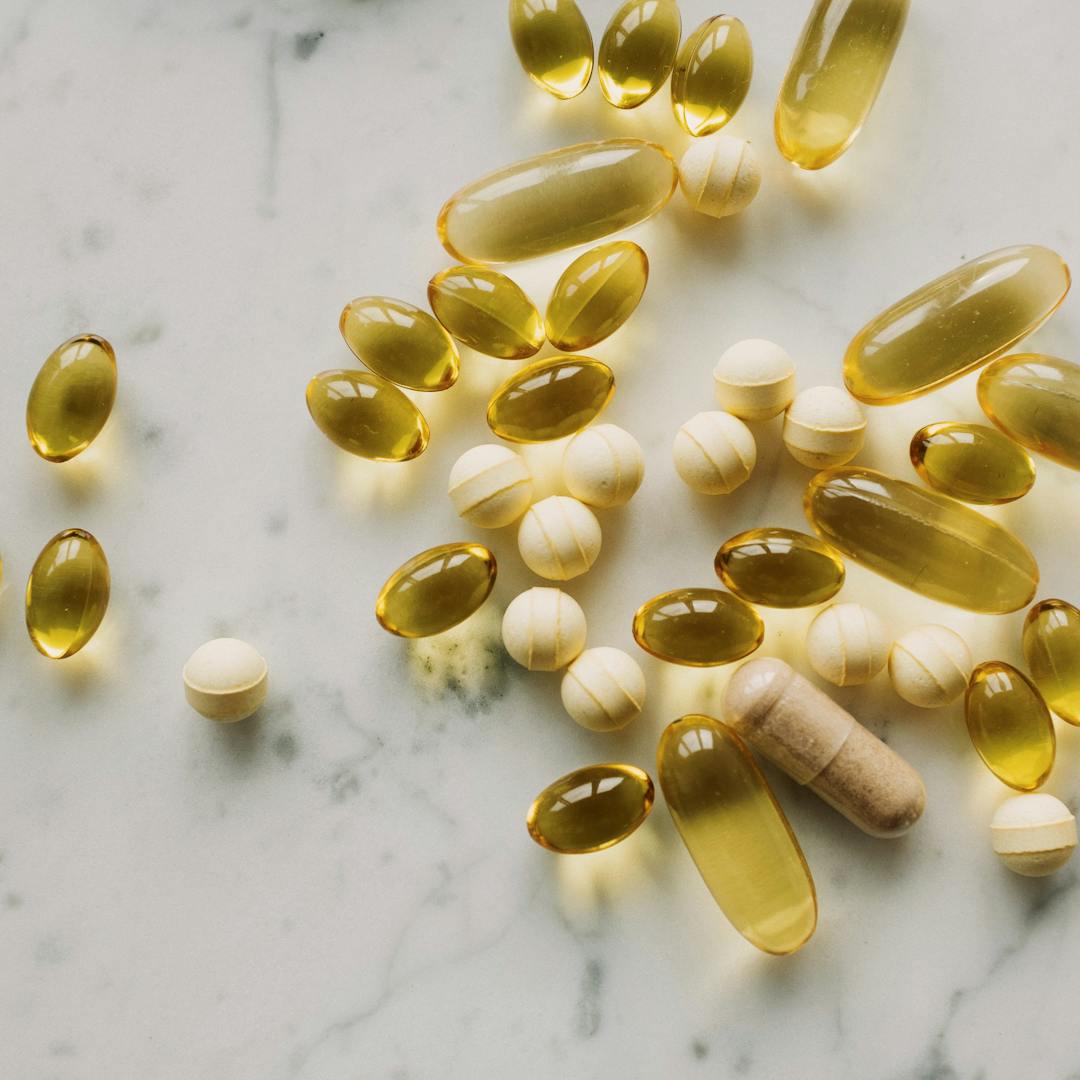
Is Omega 3 Fish Oil Good for Inflammation?
Is Omega 3 Fish Oil Good for Inflammation?
Inflammation often goes unnoticed, but make no mistake - it silently disrupts your body, leading to discomfort and potential long-term health issues.
Acute inflammation is your body's natural defense mechanism, but when it becomes chronic, it’s time for you to take matters into your own hands and address the problem.
Of the many solutions you have at your disposal, omega 3 fish oil is one of the most popular. So, is omega 3 fish oil good for inflammation? If so, why does omega 3 fish oil help with inflammation?
This versatile supplement fights inflammation head-on by interrupting the biochemical pathways that lead to inflammatory responses. We’ll show you how you can add it to your daily routine from choosing the right supplement to understanding dosage and timing.
But to start your journey to better health on the right foot, get omega 3 fish oil 1000mg at Smarter Vitamins today for the purest and most potent solution available!
Overview of Inflammation and Omega 3 Fish Oil
Before we look at the relationship between inflammation and omega 3 fish oil specifically, we want to offer a bit of background information to help you understand what exactly is going on in your body.
Definition of Inflammation
Inflammation is the body's instinctive response to injury or infection. It’s a fundamental process designed to protect and heal.
When tissues are damaged, the immune system dispatches white blood cells to the affected area to eliminate harmful stimuli and initiate repair. This response typically manifests as redness, heat, swelling, and pain.
At first, inflammation is a good thing. But you know what they say, too much of a good thing can quickly turn sour. This is why we need to distinguish between acute and chronic inflammation.
Acute vs Chronic Inflammation
There are two primary types of inflammation: acute and chronic. Acute inflammation is rapid and short-lived, usually resolving within a few days. This is what we discuss when referring to the body's immediate reaction to an injury or infection, essential for healing.
In contrast, chronic inflammation is a slower, prolonged response that can last for months or even years. It often arises without a clear injury or persists after the initial cause is gone, potentially leading to various health issues like arthritis, heart disease, and diabetes.
This is the type of inflammation you should be concerned about. So, how does omega 3 fit into the picture?
Introduction to Omega 3 Fatty Acids: EPA, DHA, and ALA
Omega 3 fatty acids are essential nutrients your body relies on for a number of functions, with three main types: eicosapentaenoic acid (EPA), docosahexaenoic acid (DHA), and alpha-linolenic acid (ALA).
EPA and DHA, primarily sourced from fish and algae, are responsible for your cardiovascular health, brain function, and reducing inflammation. This is the type we’re going to focus most of our conversation on.
On the other hand, ALA is found in plant oils like flaxseed, chia, and hemp. It’s a precursor to EPA and DHA, although the conversion process in the body is limited. These fatty acids are integral to cell membrane structure and function, influencing cell signaling pathways and immune responses.
All this being said, is omega 3 fish oil is the most popular way to get these fatty acids into your diet consistently. Sure, you can consume them directly through foods, but let’s face it - taking a supplement is so much easier when it comes to getting in your minimum daily requirements.
So, is omega 3 fish oil good for inflammation?
Is Omega 3 Fish Oil Good for Inflammation?
You’re probably familiar with the use of omega 3 fish oil for joint pain and other sorts of aches, but what about inflammation in general? How does omega 3 fish oil help with inflammation? Let’s look at the interactions it has in your body below to show you why it’s worth adding to your regimen.
How Does Omega 3 Fish Oil Help With Inflammation?
Fatty acids EPA and DHA work their way into cell membranes throughout the body, enhancing membrane fluidity and function. This influences how cells respond to inflammatory signals, aiding in the regulation and resolution of inflammation.
Those very same fatty acids also assist with the production of bioactive molecules like resolvins and protectins. These molecules are heavily involved in the inflammation resolution process, essentially “turning off” the inflammatory response once the initial threat is neutralized, thus preventing chronic inflammation.
Furthermore, omega 3 fatty acids disrupt the production of inflammatory eicosanoids derived from omega 6 fatty acids by competing for the same enzymatic pathways. This reduction in pro-inflammatory eicosanoids leads to a decrease in overall inflammation in the body.
So, yes - omega 3 fish oil does help with inflammation through quite a few different mechanisms. But just how effective is it compared to other treatments you have at your disposal?
Comparison With Other Anti-Inflammatory Treatments
Part of the appeal of using omega 3 fish oil for inflammation is how much more holistic it is compared to solutions like non-steroidal anti-inflammatory drugs (NSAIDs). You may know these by names such as Ibuprofen or Tylenol.
NSAIDs work by blocking specific enzymes involved in the inflammation pathway, providing immediate pain relief. However, their long-term use is associated with side effects like gastrointestinal issues and increased cardiovascular risk.
The same is true of solutions like corticosteroids, which are powerful medications that mimic hormones your body produces in response to stress and inflammation.
While effective in controlling severe inflammation, corticosteroids can have significant side effects in their own right, including weight gain, mood swings, and increased infection risk, especially with long-term use.
The key takeaway is this - you can use omega 3 fish oils to support a healthier inflammatory response without worrying about sketchy side effects. That being said, not all supplements are created equal - so let’s talk about what you should look for when incorporating one into your routine.
Choosing the Right Omega 3 Fish Oil for Inflammation
Whether you’re using omega 3 fish oil for brain fog or omega 3 fish oil benefits for skin, it’s imperative that you take a bit of time to do your due diligence and choose the best omega 3 fish oil supplement you can get your hands on.
We’ll point you in the right direction below by highlighting key factors to consider, from EPA and DHA content to sourcing, processing, and more. Here’s how to tell if your fish oil is good quality…
EPA and DHA Content
The efficacy of omega 3 fish oil in reducing inflammation largely depends on the concentrations of EPA and DHA. In other words, how potent is the supplement? How much of these fatty acids are you getting in every serving?
Higher levels of EPA and DHA are often more effective in managing inflammation. But beyond the dosage of these fatty acids, assess the ratio of EPA to DHA.
Typically a combined total of at least 500 mg per serving leads to therapeutic benefits. That being said, there are supplements with as much as 1000 mg that can offer more pronounced effects. For example, Smarter Vitamins uses 800mg of EPA and 600mg of DHA - more on that later.
Sourcing Considerations
Where your fish oil comes from is important for two reasons:
- It speaks to the environmental sustainability of the product
- It influences the purity of your supplement
Fish oil should come from species known for their high omega 3 content and low risk of heavy metal contamination, such as anchovies, sardines, and mackerel.
Sustainable sourcing practices, like those certified by the Marine Stewardship Council (MSC), indicate responsible fishing methods that minimize environmental impact.
Certifications and Labels
Certifications can provide assurance of the supplement’s quality and safety. Look for labels indicating third-party testing, such as those from the International Fish Oil Standards (IFOS), which test for purity, potency, and freshness.
Certifications for non-GMO and the absence of contaminants like mercury, PCBs, and dioxins are also crucial. You can also look for labels that suggest the product was produced in an FDA-registered facility, cGMP (good manufacturing practice), and more for extra peace of mind.
Processing Methods
The way omega 3 fish oil is extracted and processed affects its quality and effectiveness. Cold-pressed and molecularly distilled fish oils are preferred as they help maintain the integrity of the oil and remove impurities.
Additionally, processing methods that protect against oxidation, such as nitrogen flushing, ensure the oil remains fresh and potent.
Why Smarter Vitamins is the #1 Choice
While there are many supplements at your fingertips, you can rest assured you’re getting the potent, pure solution you deserve at Smarter Vitamins.
We source our Triple Strength Omega-3 Fish Oil from pristine Alaskan waters and then process it using a cold extraction method that maintains its nutritional integrity. This method is coupled with our commitment to non-GMO ingredients and adherence to cGMP standards, as we take purity seriously.
You can rest assured the supplement is free from unnecessary fillers and harmful additives such as magnesium stearate, dioxides, and artificial colors. You don’t have to take our word for it, either, as we implement rigorous third-party testing to make sure every product we sell aligns with our standards.
Our fish oil's benefits extend beyond inflammation reduction to improving mental clarity, supporting eye health, boosting cardiovascular health, and promoting healthy hair, skin, and nails.
We also have a full lineup of other supplements to support your health goals, from the best maca root supplement to the best caffeine and l-theanine pills and a whole lot more.
More than 800,000 customers have placed their trust in us to deliver world-class wellness products, and you can too. So, order yours fish oil today and learn more about using it to support a healthier inflammatory response below.
How Much Omega 3 Fish Oil for Inflammation Do You Need?
Once you’ve got the right omega 3 fish oil for inflammation it’s time to start incorporating it into your daily routine. So, how much omega 3 fish oil for inflammation should you take on a daily basis?
There’s not necessarily a one-size-fits-all answer, as your specific level of chronic inflammation, dietary intake, and specific health goals will influence how much you need to take.
That being said, anywhere from 1,000mg to 3,000mg is the range shown to reduce markers of inflammation, such as C-reactive protein (CRP), and support overall inflammatory health.
Not all of that has to come from your supplement, though. You can take a serving of Smarter Vitamins and bolster it by eating dinner with more fish or certain nuts.
It’s also worth noting that your specific health status should take precedence when determining your dosage. For example, if you’re dealing with specific inflammatory conditions like rheumatoid arthritis or heart disease, your healthcare provider may recommend higher doses.
More Tips on Incorporating Omega 3 Fish Oil Into Your Life
Before we wrap this guide up we want to leave you with a few more parting tips on using omega 3 fish oil for inflammation:
- Establish a Routine: One of the most common questions we get asked is - when is the best time to take omega 3 fish oil? At the same time each day, possibly with a meal, to improve absorption and make it a regular part of your day.
- Meal Timing: Omega 3 fish oil is best absorbed when taken with meals, especially those containing healthy fats. This can enhance the bioavailability of EPA and DHA, making them more effective in combating inflammation.
- Spread the Dosage: Consider splitting the dose across different meals if you’re taking a lot of omega. This can reduce any potential digestive discomfort and maximize absorption throughout the day.
- Track Your Progress: Monitoring how your body responds to Omega 3 supplementation can help gauge its effectiveness. Note any changes in symptoms related to inflammatory conditions and discuss these with your healthcare provider.
- Adjust as Needed: Your Omega 3 needs may change based on dietary changes, health conditions, or as you age. Be open to adjusting your dosage based on ongoing health assessments and professional advice.
- Address Dietary Balance: Omega 3 intake is most effective when balanced with your overall diet. Aim to reduce the intake of Omega 6 fatty acids, found in processed foods and certain vegetable oils, which can promote inflammation.
Put these tips into practice and you’ll be well on your way to supporting a healthier inflammatory response with omega 3 fish oil!
Final Thoughts on Omega 3 Fish Oil for Inflammation
That concludes our guide on using omega 3 fish oil for inflammation. This supplement is your natural solution to managing chronic inflammation and promoting better health overall.
Remember, choosing a sustainably sourced, high-EPA and DHA supplement is crucial for the best results. You also need to make omega 3 fish a consistent part of your daily routine to harness its full benefits.
You can learn more about this supplement in our blog with resources like how long does fish oil take to work, fish oil vs omega 3, benefits of fish oil during pregnancy, cod liver oil vs fish oil, how is fish oil made, and more.
Otherwise, invest in better health today at Smarter Vitamins. The most potent, pure omega 3 fish oil for inflammation is just a few clicks away!
Get exclusive access to sales, discounts, new product launches, awesome content & more.
Once a month or so.

































